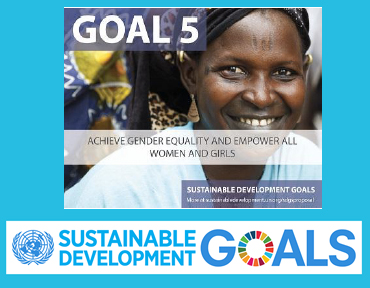
New Sustainable Development Goals Will Guide DFW Decisions
By Beth Ellen Holimon, Executive Director
On September 25th, the United Nations made a historic and bold move by adopting the 2030 Sustainable Development Goals (SDGs). These new SDGs follow and expand on the Millennium Development Goals (MDGs) which were set in 2001 and are due to expire at the end of this year. Each goal has specific targets to be achieved over the next 15 years.
The Millennium Development Goals were a good framework for governments and international aid that have resulted in many global improvements, but they were too narrow to create comprehensive change. For the past two years, thousands of stakeholders have been developing a new approach. The 17 SDGs, which include 169 individual targets, are collaborative and transformational; they are inextricably linked to each other and reliant on each other for total success.
At Dining for Women, we will use the 2030 SDGs to guide our decisions in grant making, partnerships, grassroots advocacy, diversity initiatives, and even management. What I love about these goals is that they don’t just apply to the “developing world”. They affect all of us in our homes and in our everyday decisions and make it easy to see the connection between decisions we make today and the effect those decisions have on the future of girls in the developing world.
We know that creating equity for girls and women empowers not just them, but their families, their communities, and their countries. We know that “gender inequality has an impact on everything from population growth to economics and regime type.”1 We know that the greater the violence against women in a country, the more likely they are to go to war. We know that “more lives are lost through violence against women from sex-selective abortion, female infanticide, suicide, egregious maternal mortality, and other sex-linked causes than were lost during all the wars and civil strife of the 20th century.”2 We also know that investing in the empowerment of women and girls makes a difference.
In addition to reaching the deadline for the MDGs, this year we also celebrate the 15th anniversary of UN Security Council Resolution 1325 on women, peace, and security. The Convention on the Elimination of All Forms of Discrimination against Women (CEDAW), adopted in 1979, called for the end of discrimination. Still, even with these policies in place, only two out of 130 countries have achieved gender parity in education, and women represent only 21% of parliamentarians. At this rate, it will take 40 MORE YEARS to achieve gender parity.3
In the SDGs, Goal #5 is to “achieve gender equality and empower all women and girls”. This encourages one to look at each of the 17 SDGs through a gendered lens – women are considered in targets of other goals too. Goal #5 is far more inclusive than its predecessor in the MDGs by recognizing that women’s empowerment is a pre-condition for eradicating poverty and hunger, improving health, and ending violence against women. However, the only way we can change the way the world works is to ensure that Goal #5 is integrated and considered in all funding, treaties, laws, and peace tables.
Over the next five years, you will see Dining for Women take on this challenge in a serious and strategic manner. We will harness our grassroots voices, strategically direct our grants, and partner with like-minded organizations to ensure that Goal #5 is a priority beyond our chapter meetings. Are you ready?
1 Hudson, Valerie. Sex and World Peace. 2012. p 5.
2 Hudson, Valerie. Sex and World Peace. 2012. p 4.
3 http://www.unwomen.org/en/news/in-focus/mdg-momentum#MDG3
GOAL #5 – ACHIEVE GENDER EQUALITY AND EMPOWER ALL WOMEN AND GIRLS
TARGETS
5.1
End all forms of discrimination against all women and girls everywhere.
5.2
Eliminate all forms of violence against all women and girls in the public and private spheres, including trafficking and sexual and other types of exploitation.
5.3
Eliminate all harmful practices, such as child, early and forced marriage and female genital mutilation.
5.4
Recognize and value unpaid care and domestic work through the provision of public services, infrastructure and social protection policies and the promotion of shared responsibility within the household and the family as nationally appropriate.
5.5
Ensure women’s full and effective participation and equal opportunities for leadership at all levels of decision-making in political, economic and public life.
5.6
Ensure universal access to sexual and reproductive health and reproductive rights as agreed in accordance with the Programme of Action of the International Conference on Population and Development and the Beijing Platform for Action and the outcome documents of their review conferences.
5.a
Undertake reforms to give women equal rights to economic resources, as well as access to ownership and control over land and other forms of property, financial services, inheritance and natural resources, in accordance with national laws.
5.b
Enhance the use of enabling technology, in particular information and communications technology, to promote the empowerment of women.
5.c
Adopt and strengthen sound policies and enforceable legislation for the promotion of gender equality and the empowerment of all women and girls at all levels.
Learn More: SDGs Fact Sheet
